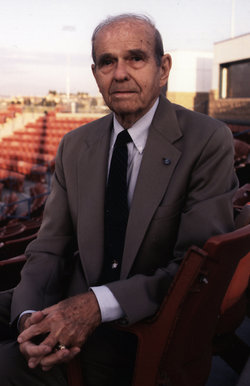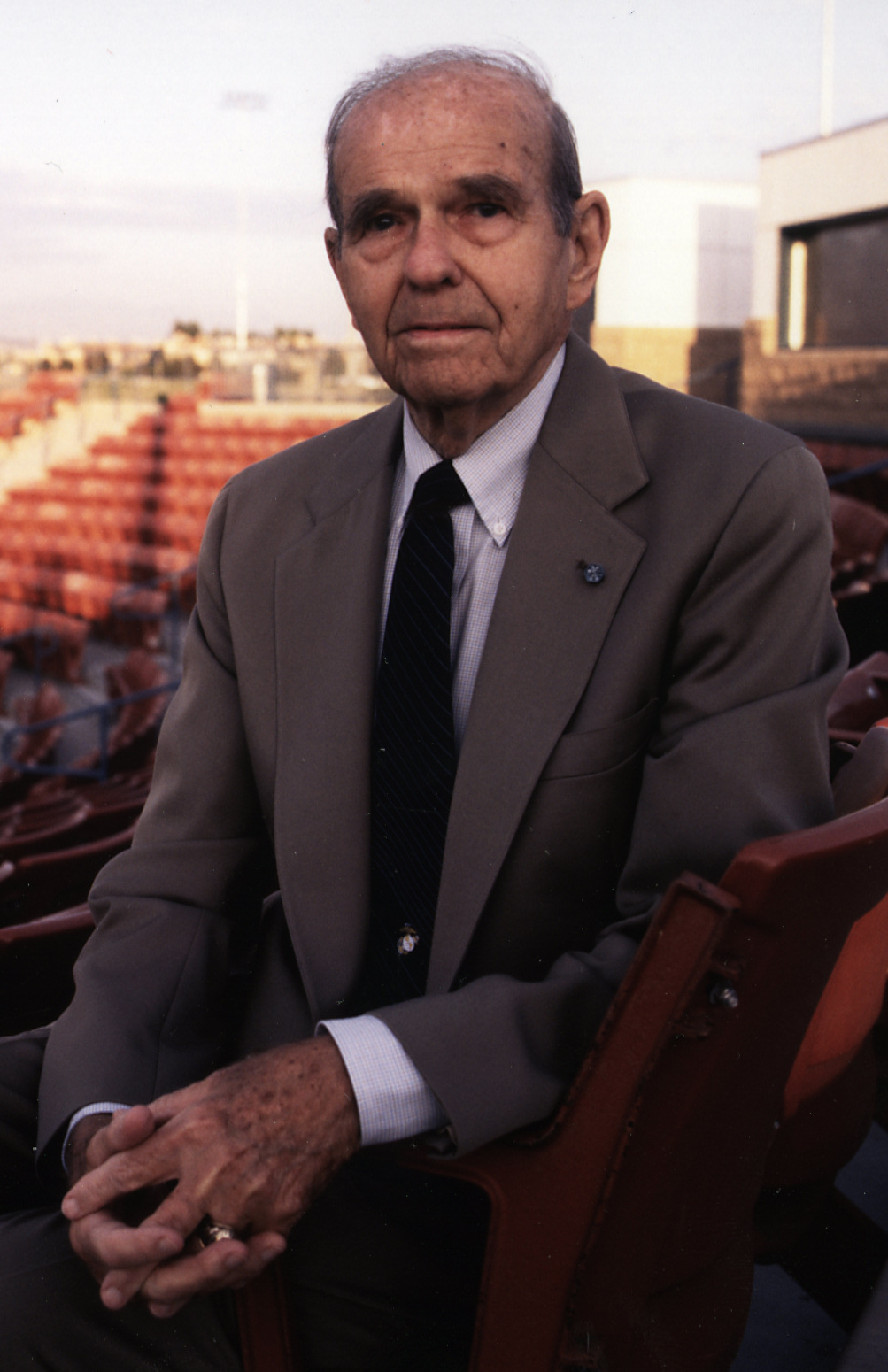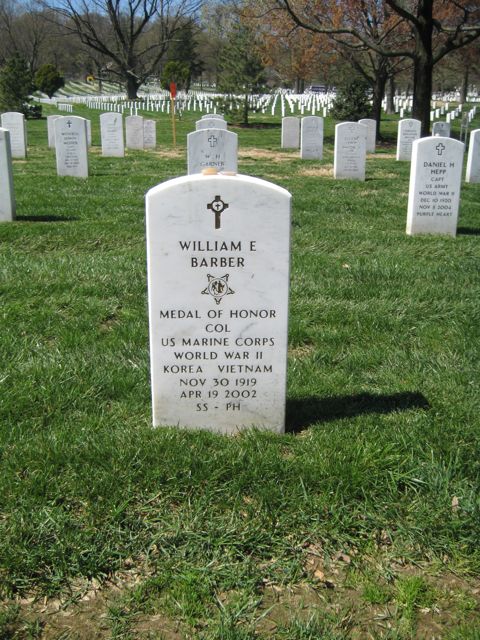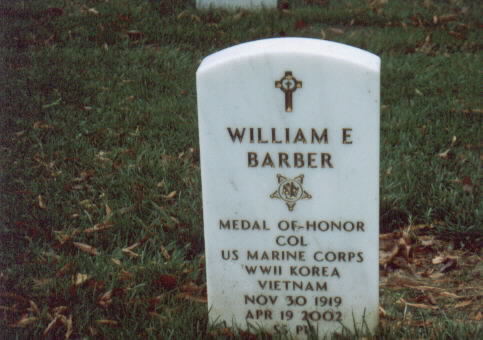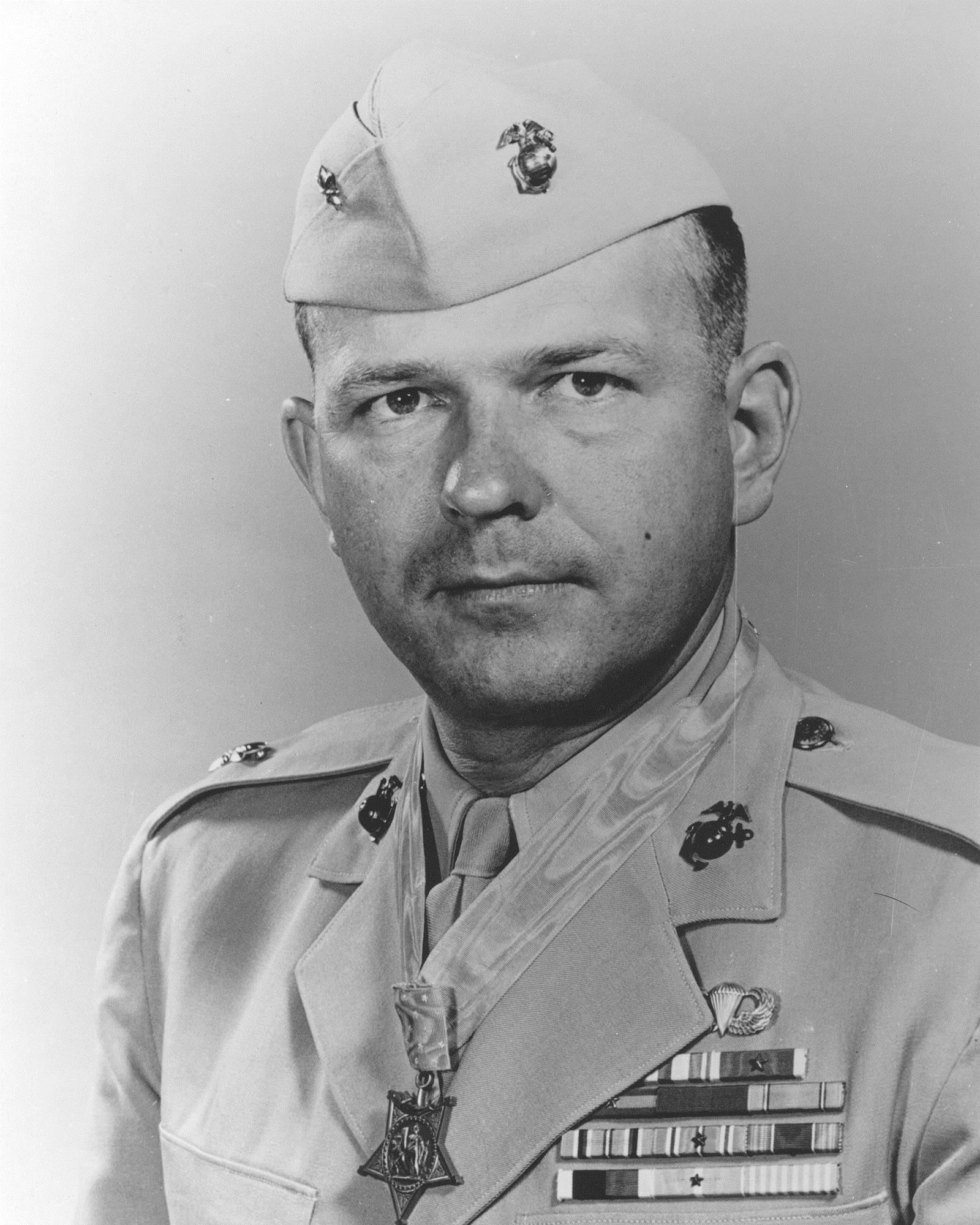Korean War Medal of Honor Recipient. A decorated veteran, he received the award from President Harry S. Truman at the White House on August 20, 1952, for his actions as a Captain in the United States Marine Corps from November 28 until December 2, 1950, at the Battle of Chosin Reservoir in North Korea.
He joined the Marine Corps in March 1940, and, two years later, was commission as a 2nd Lieutenant. During World War II, he saw action at the Battle of Iwo Jima where he was twice wounded. After serving in occupied Japan, he returned to the United States in 1946 and was posted to several stateside assignments. In 1950, he was sent to Korea where his heroism won him the Medal of Honor. He returned to the United States in April 1951 and joined the Marine Corps Recruit Depot in San Diego, California, as a Company Commander and later became Executive Officer of the 1st Recruit Training Battalion. In July 1952, he was promoted to the rank of Major. He later served at Camp Lejeune, North Carolina; the American Embassy at Bangkok, Thailand; and in Okinawa, Japan; before closing out his military career in South Vietnam with the 3rd Marine Amphibious Force, Military Assistance Command. In 1970, he retired at the rank of Colonel with 30 years of continuous military service.
Among his military honors and awards include the Silver Star, the Legion of Merit (with 'V' device), the Purple Heart (with one gold star), the World War II Victory Medal, the Combat Action Ribbon (with two gold stars), the Korean Service Medal (with three campaign stars), the Vietnam Service Medal (with one campaign star), and the Korean War Service Medal. After his retirement, he became a civilian military analyst for the Northrup Corporation. He died at the age of 82.
His Medal of Honor citation reads: "For conspicuous gallantry and intrepidity at the risk of his life above and beyond the call of duty as Commanding Officer of Company F, Second Battalion, Seventh Marines, First Marine Division (Reinforced), in action against enemy aggressor forces in Korea from November 28 to December 2, 1950. Assigned to defend a three-mile mountain pass along the division's main supply line, and commanding the only route of approach in the march from Yudam-Ni to Hagaru-ri, Captain Barber took position with his battle-weary troops and, before nightfall, had dug in and set up a defense along the frozen, snow-covered hillside. When a force of estimated regimental strength savagely attacked during the night, inflicting heavy casualties, and finally surrounding his position following a bitterly fought seven-hour conflict, Captain Barber, after repulsing the enemy, gave assurance that he could hold if supplied by air drops and requested permission to stand fast when orders were received by radio to fight his way back to a relieving force, after two reinforcing units had been driven back under fierce resistance in their attempts to reach the isolated troops. Aware that leaving the position would sever contact with the 8,000 Marines trapped at Yudam-ni and jeopardize their chances of joining the 3,000 more awaiting their arrival in Hagaru-ri for the continued drive to the sea, he chose to risk the loss of his command rather than sacrifice more men if the enemy seized control and forced a renewed battle to regain the position, or abandon his many wounded who were unable to walk. Although severely wounded in the leg the early morning of the 29th, Captain Barber continued to maintain personal control, often moving up and down the lines on a stretcher to direct the defense and consistently encouraging and inspiring his men to supreme efforts despite the staggering opposition. Waging desperate battle throughout five days and six nights of repeated onslaughts launched by the fanatical aggressors, he and his heroic command accounted for approximately 1,000 enemy dead in this epic stand in bitter sub-zero weather, and, when the company was relieved, only 82 of his original 220 men were able to walk away from the position so valiantly defended against insuperable odds. His profound faith and courage, great personal valor, and unwavering fortitude were decisive factors in the successful withdrawal of the division from the deathtrap in the Chosin Reservoir sector and reflect the highest credit upon Captain Barber, his intrepid officers, and men and the United States Naval Service."
Korean War Medal of Honor Recipient. A decorated veteran, he received the award from President Harry S. Truman at the White House on August 20, 1952, for his actions as a Captain in the United States Marine Corps from November 28 until December 2, 1950, at the Battle of Chosin Reservoir in North Korea.
He joined the Marine Corps in March 1940, and, two years later, was commission as a 2nd Lieutenant. During World War II, he saw action at the Battle of Iwo Jima where he was twice wounded. After serving in occupied Japan, he returned to the United States in 1946 and was posted to several stateside assignments. In 1950, he was sent to Korea where his heroism won him the Medal of Honor. He returned to the United States in April 1951 and joined the Marine Corps Recruit Depot in San Diego, California, as a Company Commander and later became Executive Officer of the 1st Recruit Training Battalion. In July 1952, he was promoted to the rank of Major. He later served at Camp Lejeune, North Carolina; the American Embassy at Bangkok, Thailand; and in Okinawa, Japan; before closing out his military career in South Vietnam with the 3rd Marine Amphibious Force, Military Assistance Command. In 1970, he retired at the rank of Colonel with 30 years of continuous military service.
Among his military honors and awards include the Silver Star, the Legion of Merit (with 'V' device), the Purple Heart (with one gold star), the World War II Victory Medal, the Combat Action Ribbon (with two gold stars), the Korean Service Medal (with three campaign stars), the Vietnam Service Medal (with one campaign star), and the Korean War Service Medal. After his retirement, he became a civilian military analyst for the Northrup Corporation. He died at the age of 82.
His Medal of Honor citation reads: "For conspicuous gallantry and intrepidity at the risk of his life above and beyond the call of duty as Commanding Officer of Company F, Second Battalion, Seventh Marines, First Marine Division (Reinforced), in action against enemy aggressor forces in Korea from November 28 to December 2, 1950. Assigned to defend a three-mile mountain pass along the division's main supply line, and commanding the only route of approach in the march from Yudam-Ni to Hagaru-ri, Captain Barber took position with his battle-weary troops and, before nightfall, had dug in and set up a defense along the frozen, snow-covered hillside. When a force of estimated regimental strength savagely attacked during the night, inflicting heavy casualties, and finally surrounding his position following a bitterly fought seven-hour conflict, Captain Barber, after repulsing the enemy, gave assurance that he could hold if supplied by air drops and requested permission to stand fast when orders were received by radio to fight his way back to a relieving force, after two reinforcing units had been driven back under fierce resistance in their attempts to reach the isolated troops. Aware that leaving the position would sever contact with the 8,000 Marines trapped at Yudam-ni and jeopardize their chances of joining the 3,000 more awaiting their arrival in Hagaru-ri for the continued drive to the sea, he chose to risk the loss of his command rather than sacrifice more men if the enemy seized control and forced a renewed battle to regain the position, or abandon his many wounded who were unable to walk. Although severely wounded in the leg the early morning of the 29th, Captain Barber continued to maintain personal control, often moving up and down the lines on a stretcher to direct the defense and consistently encouraging and inspiring his men to supreme efforts despite the staggering opposition. Waging desperate battle throughout five days and six nights of repeated onslaughts launched by the fanatical aggressors, he and his heroic command accounted for approximately 1,000 enemy dead in this epic stand in bitter sub-zero weather, and, when the company was relieved, only 82 of his original 220 men were able to walk away from the position so valiantly defended against insuperable odds. His profound faith and courage, great personal valor, and unwavering fortitude were decisive factors in the successful withdrawal of the division from the deathtrap in the Chosin Reservoir sector and reflect the highest credit upon Captain Barber, his intrepid officers, and men and the United States Naval Service."
Bio by: William Bjornstad
Inscription
MEDAL OF HONOR
COL
US MARINE CORPS
WORLD WAR II
KOREA VIETNAM
SS - PH
Family Members
Advertisement
